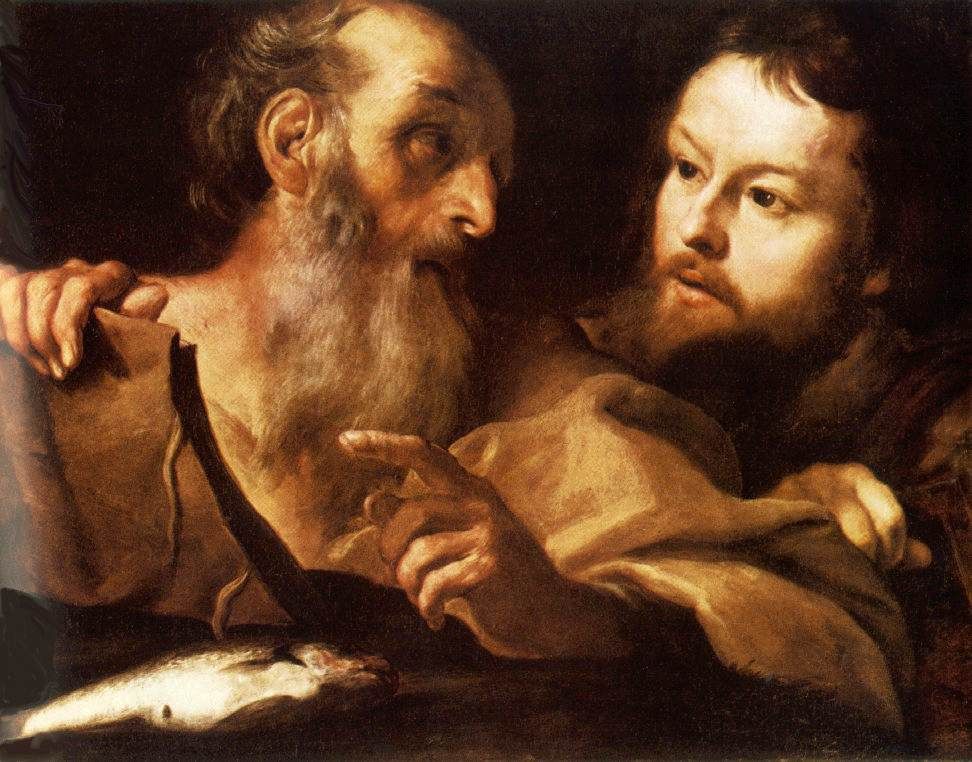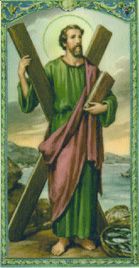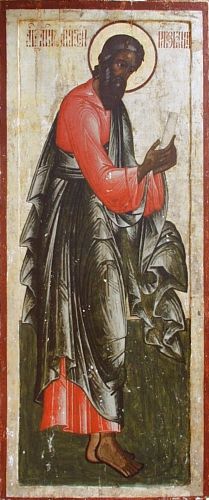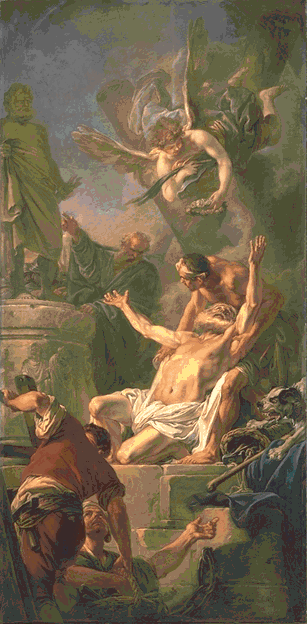Today, November 30, we celebrate the feast day of Saint Andrew (died 60 AD), the Lord’s first apostle, martyr for the faith, and patron saint of Scotland. While John is not featured prominently in the New Testament (although is always listed within the first four disciples, signifying importance), we realize that his faith brought not only his brother, Simon Peter, to follow Jesus, but also many others. Throughout his life, Andrew testified to the love and divinity of Christ, earning himself the martyr’s crown.
Andrew, like his brother Simon Peter, was a fisherman. Early in his life, he became a disciple of Saint John the Baptist, but was quick to understand the implication of Saint John’s naming of Jesus, “Behold the Lamb of God!”
29 The next day John saw Jesus coming toward him and said, “Look, the Lamb of God, who takes away the sin of the world! 30 This is the one I meant when I said, ‘A man who comes after me has surpassed me because he was before me.’ 31 I myself did not know him, but the reason I came baptizing with water was that he might be revealed to Israel.”
32 Then John gave this testimony: “I saw the Spirit come down from heaven as a dove and remain on him. 33 And I myself did not know him, but the one who sent me to baptize with water told me, ‘The man on whom you see the Spirit come down and remain is the one who will baptize with the Holy Spirit.’ 34 I have seen and I testify that this is God’s Chosen One.”
35 The next day John was there again with two of his disciples. 36 When he saw Jesus passing by, he said, “Look, the Lamb of God!”
37 When the two disciples heard him say this, they followed Jesus. 38 Turning around, Jesus saw them following and asked, “What do you want?”
They said, “Rabbi” (which means “Teacher”), “where are you staying?”
39 “Come,” he replied, “and you will see.”
So they went and saw where he was staying, and they spent that day with him. It was about four in the afternoon.
40 Andrew, Simon Peter’s brother, was one of the two who heard what John had said and who had followed Jesus. 41 The first thing Andrew did was to find his brother Simon and tell him, “We have found the Messiah” (that is, the Christ). 42 And he brought him to Jesus.
Jesus looked at him and said, “You are Simon son of John. You will be called Cephas” (which, when translated, is Peter). (John 1: 29-42)
After hearing John’s proclamation, Andrew, without hesitation, left Saint John and began to follow Jesus, recognizing him as master. Jesus knew that Andrew was walking behind him, and turning back, he asked, "what do you seek?" When Andrew answered that he would like to know where Jesus lived, Our Lord replied, "Come and see." Andrew had been only a little time with Jesus when he realized that this was truly the Messiah.
It was later, that while Andrew and his brother were fishing that the Lord called them to the apostolate.
18 As Jesus was walking beside the Sea of Galilee, he saw two brothers, Simon called Peter and his brother Andrew. They were casting a net into the lake, for they were fishermen. 19 “Come, follow me,” Jesus said, “and I will send you out to fish for people.” 20 At once they left their nets and followed him. (Matthew 4: 18-20)
Only two other explicit references to Saint Andrew are contained in the Gospels. The first occurs during the miracle of the loaves and fishes. It was Andrew who reported that a local boy had bread and fish with him:
8 Another of his disciples, Andrew, Simon Peter’s brother, spoke up, 9 “Here is a boy with five small barley loaves and two small fish, but how far will they go among so many?” (John 6: 8-9)
This suggests that Andrew may have been one of the twelve who helped manage the day-to-day tasks of Jesus’ ministry. It was he who was circulating through the crowd of five thousand, attending to the practical needs of the people.
The second of the explicit references to Saint Andrew occurs a few days before the death of Jesus, when Saint Philip was asked by some Greek festival-goers for an audience with Jesus. Philip referred the matter to Andrew, as one of greater authority.
20 Now there were some Greeks among those who went up to worship at the festival. 21 They came to Philip, who was from Bethsaida in Galilee, with a request. “Sir,” they said, “we would like to see Jesus.” 22 Philip went to tell Andrew; Andrew and Philip in turn told Jesus.
23 Jesus replied, “The hour has come for the Son of Man to be glorified. 24 Very truly I tell you, unless a kernel of wheat falls to the ground and dies, it remains only a single seed. But if it dies, it produces many seeds. 25 Anyone who loves their life will lose it, while anyone who hates their life in this world will keep it for eternal life. 26 Whoever serves me must follow me; and where I am, my servant also will be. My Father will honor the one who serves me.
27 “Now my soul is troubled, and what shall I say? ‘Father, save me from this hour’? No, it was for this very reason I came to this hour. 28 Father, glorify your name!” (John 12: 20-28)
These two moments in the life of Saint Andrew demonstrate his closeness to Jesus, one of his trusted circle of disciples. Saint Andrew was present at the Last Supper, beheld the Risen Lord in the Upper Room, witnessed the Ascension, was filled with the Spirit at Pentecost, and continued to preach following the Ascension of Jesus into Heaven. Church legend tells us that Saint Andrew traveled to Greece, Turkey, and Palestine to preach following the death, Resurrection, and Ascension of Jesus.
While the exact location of his preaching is unclear, it is generally agreed upon that he was crucified by order of the Roman Governor Aegeas, at Patrae (in Achaia). Upon seeing the cross that would bear him to his death, Saint Andrew was overwhelmed with love, such was his faith in Christ. As he was bound to the X-shaped cross with rope (rather than nails, to prolong his suffering), he exclaimed:
“O most beautiful cross that was glorified by carrying the body of Christ! Glorious cross, sweetly desired, ardently loved, always sought, and finally prepared for my heart that has so long awaited you. Take me, o cross! Embrace me. Release me from my life among men. Bring me quickly and diligently to the Master. Through you He will receive me, He, Who through you has saved me.”
Saint Andrew remained two days on the cross, suffering, yet preaching to the people. His last words were recorded as follows:
“Lord, eternal King of glory, receive me hanging from the wood of this sweet cross. Thou who art my God, whom I have seen, do not permit them to loosen me from the cross. Do this for me, O Lord, for I know the virtue of Thy Holy Cross.”
The X-shaped decussate cross is now known as Saint Andrew’s Cross. Saint Andrew was buried in Patrae, but eventually his relics were translated to Constantinople, and deposited in the church of the Apostles there, around 357 A.D. When Constantinople fell to French occupation and rule, in the beginning of the thirteenth century, Cardinal Peter of Capua brought the relics to Italy and placed them in the cathedral of Amalfi, where most of them still remain. Saint Regulas also took some of these relics, warned in a dream by an angel, to Scotland with him, explaining Saint Andrew’s association with Scotland.
As is the case with most of the Disciples of Christ, the Gospels tell us very little about the holiness of Saint Andrew. We are left to infer from the words of the New Testament that his life was one of close companionship with Jesus, of service to the Lord and others, and of deep faith and holiness. Jesus called him personally to follow Him, and he gave up all that he had, without hesitation, to do so. We are called to the same life of service, of following Christ, of holiness today. How will we answer the call?
From a homily on the Gospel of John by Saint John Chrysostom:
“After Andrew had stayed with Jesus and had learned much from him, he did not keep this treasure to himself, but hastened to share it with his brother Peter. Notice what Andrew said to him: “We have found the Messiah, that is to say, the Christ.” Notice how his words reveal what he has learned in so short a time. They show the power of the master who has convinced them of this truth. Andrew’s words reveal a soul waiting with the utmost longing for the coming of the Messiah, looking forward to his appearing from heaven, rejoicing when he does appear, and hastening to announce to great an event to others. To support one another in the things of the spirit is the true sign of good will between brothers, loving kinship and sincere affection.”
Prayer to Saint Andrew
O Glorious Saint Andrew, you were the first to recognize and follow the Lamb of God. With your friend Saint John you remained with Jesus for that first day, for your entire life, and now throughout eternity.
As you led your brother Saint Peter to Christ and many others after him, draw us also to him. Teach us to lead others to Christ solely out of love for him and dedication in his service. Help us to learn the lesson of the Cross and to carry our daily crosses without complaint so that they may carry us to Jesus.
Almighty God, who didst give such grace unto thy holy Apostle Saint Andrew, that he readily obeyed the calling of thy Son Jesus Christ, and followed him without delay; Grant unto us all, that we, being called by thy holy word, may forthwith give up ourselves obediently to fulfill thy holy commandments; through Jesus Christ our Lord. Amen.
Year 2: Day 334 of 365
Prayer Intentions: An attitude of holiness. The courage to answer the call of the Lord.
Requested Intentions: Financial security for a mother (M); Health, finances, successful marriage (A); Successful resolution of court case for son (K); Continued sobriety (N); Healing of a chronic health condition (B); Successful employment (A): Peace in a family, recovery of a niece from substance use (L); Blessings on a marriage, healing of a husband (P); For the health and recovery of sisters (B); For a daughter and granddaughter (D); Blessings on overseas employment (M); Healing of mother (L); Successful employment for husband (G); Successful employment, personal fulfillment (C); Health and recovery of ill sister (A); Resolution of legal issues; Grace and protection (E); Successful and meaningful employment (S); Restoration of a marriage (A); Peace and tolerance in a family, support for those with Parkinson’s Disease (M); For the restoration of a daughter’s marriage, end to debt (S); Employment and continued strength (K); Successful examinations for a son (J); Employment and blessings of a child (S); Employment and financial security (F); Successful work placement, continued health (A); Grace and healing for a family (P); Healing of a father (M).
Why pray the Rosary every day for a year?
Each time the Blessed Virgin has appeared-- whether it be to Saint Bernadette Soubirous at Lourdes; to Lucia, Jacinta, and Francisco at Fatima; or to Mariette Beco at Banneux-- she has asserted the importance, saving grace, and power of praying the Holy Rosary on a daily basis. Based upon her words, the Rosary is penance and conversion for sinners, a pathway to peace, an end to war, and a powerful act of faith in Jesus Christ. Pope Paul VI presented the Rosary as a powerful means to reach Christ "not merely with Mary but indeed, insofar as this is possible to us, in the same way as Mary, who is certainly the one who thought about Him more than anyone else has ever done."
To show us how this is done, perhaps no one has been more eloquent than the great Cardinal Newman, who wrote: "The great power of the Rosary consists in the fact that it translates the Creed into Prayer. Of course, the Creed is already in a certain sense a prayer and a great act of homage towards God, but the Rosary brings us to meditate again on the great truth of His life and death, and brings this truth close to our hearts. Even Christians, although they know God, usually fear rather than love Him. The strength of the Rosary lies in the particular manner in which it considers these mysteries, since all our thinking about Christ is intertwined with the thought of His Mother, in the relations between Mother and Son; the Holy Family is presented to us, the home in which God lived His infinite love."
As Mary said at Fatima, "Jesus wants to use you to make Me known and loved. He wishes to establish the devotion to My Immaculate Heart throughout the world. I promise salvation to whoever embraces it; these souls will be dear to God, like flowers put by Me to adorn his throne."

Subscribe to:
Post Comments (Atom)
























0 comments:
Post a Comment
Thanks for leaving a comment. If you wish to submit a prayer request, however, please do so above, using the "Contact" tab.